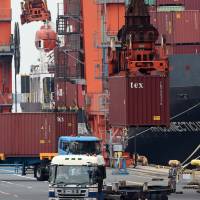The nation's current account balance was in the black for the first time in two months in July, hitting ¥416.7 billion as the income from foreign investments rose to a record high for the month, outweighing the trade deficit, the government said Monday.
Imports increased 7.6 percent from a year earlier to ¥7.075 trillion due in part to rising imports of crude oil and liquefied natural gas, while exports climbed 8.0 percent to ¥6.247 trillion on the back of growth in car shipments, bringing the goods trade deficit to ¥828.1 billion, the Finance Ministry said.
The surplus in the primary income account, which reflects how much Japan earns from its foreign investments, however, rose for the first time in four months, up 2.8 percent to ¥1.853 trillion, buoyed by dividends from foreign direct investment amid the weakening yen, the ministry said in a preliminary report.
Japan's current account balance had been on a deteriorating trend amid growing demand for gas and oil from utilities in the aftermath of the March 2011 disasters.
Some analysts say the current account balance is expected to improve, given that the consumption tax hike from 5 percent to 8 percent from April 1 may choke private spending and production at home, preventing imports from growing further.
But Kaori Yamato, an economist at the Mizuho Research Institute, said the trade deficit is unlikely to narrow sharply, as the pace of expansion in Japan's exports is set to slow with global economic growth moderating.
"There is little possibility that Japan's current account surplus will continue to increase," Yamato added.



